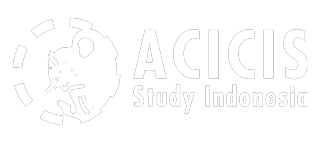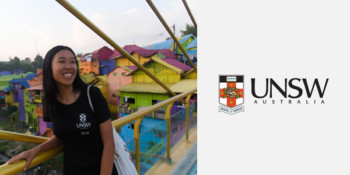Jessica Cong is a 2018 New Colombo Plan Scholar from the University of New South Wales. Jessica undertook the Development Studies Immersion Program at Universitas Gadjah Mada in Semester 1, 2019.
Q: Why did you decide to undertake ACICIS’ Development Studies Immersion Program (DSIP) ?
I decided on the Development Studies Immersion Program because it provided me with a balance between language training, seminars and fieldtrips on development in Indonesia, as well as an internship within the development sector. I applied to do my internship at Credit Union Dharma Prima Kita because I was interested in financial inclusion and microfinance.
Q: Did you receive a New Colombo Plan Mobility Grant? If so, how did this contribute to your experience in Indonesia?
I received the 2018 New Colombo Plan Scholarship and it definitely enabled me to pursue my studies in Indonesia. It also led to some really interesting opportunities to participate in events hosted by the Australian Embassy in Jakarta and the Australian Consulate-General in Surabaya to learn more about the importance of the Australia-Indonesia relationship.
Q: Are you involved in any clubs/societies at the university?
I joined SAKA UGM with a few friends from ACICIS to learn the Saman dance that originates from Aceh. Saman is known as the ‘dance of one thousand hands’ because of its incredibly fast-paced synchronised rhythmic movements. The SAKA UGM team have generously been teaching us the basics of Saman. I have also participated in a Javanese dance group at UGM and have attended Australian Indonesian Youth Association (AIYA) events throughout the semester.
Q: How will the DSIP influence your future career or study?
The Development Studies Immersion Program has taught me valuable lessons about being flexible and adaptable in my communication and the importance of building strong cross-cultural relationships. I arrived in Indonesia with little knowledge of Bahasa Indonesia beyond ‘terima kasih’ so it’s been very rewarding to challenge myself and learn a new language. DSIP has enabled me to pursue a line of study that I’ve always been interested in and given me a glimpse into a different way of life.
I’m in my final year of my actuarial studies degree at UNSW. My internship at Credit Union Dharma Prima Kita has highlighted to me how different skills can be utilised to support international development. For example, I worked on some data analysis on loan repayment and data visualisation on the accessibility of credit through utilising member’s home address data.
Q: How does development in Indonesia differ to what you’ve seen before?
The level of financial inclusion in Indonesia has grown quickly with the proportion of banked Indonesian adults growing from 20% in 2011 to 49% in 2017 (World Bank Global Findex). Given that internet and mobile phone penetration is very high in Indonesia, it’s very exciting to see organisations utilising this opportunity and working together in the FinTech space to enhance financial inclusion and economic empowerment.
Q: What do you like to do in your spare time in Yogyakarta?
I like walking around and exploring Yogyakarta on foot which isn’t too popular of an activity among locals given the convenience of bikes. My language teachers were shocked when I said I had walked 2km from my kos to UGM and my colleagues insisted on driving me to the ATM which was 250m away. I enjoy hanging out with friends from Australia and Indonesia and trying new foods at restaurants and cafés.
Q: Are you undertaking an internship or student community service (KKN) while in Indonesia?
I’m currently doing an internship at Credit Union Dharma Prima Kita who provide access to financial services such as savings accounts, insurance and loans to its members. I have been learning about the internal business operations of credit unions, monitoring and analysing loan repayment data, assisting with administrative tasks such as inputting member data, and conducting research on financial inclusion in Indonesia. I also teach conversational English classes twice a week to 15 staff from the credit union.
The experience has given me insight into business culture in Indonesia and how technical skills can be applied to the development sector. One of the most interesting parts of my internship has been interviewing credit union members to learn more about why they chose to become a member of the credit union and how their loans have had an impact on their micro-enterprises.
Q: Favourite Indonesian food/place to eat:
My favourite Indonesian foods are soto ayam from Soto Ayam Pak Yanto and lotek with bakwan from the Fakultas Ilmu Budaya canteen. My friends and I also eat a lot of martabak manis and roti bakar.
Q: Favourite Indonesian word/phrase:
My favourite words are ‘sudah’ (already) and ‘belum’ (not yet). These are one of the very first words you learn and are one of very few tense indicators in Bahasa Indonesia. ‘Sudah’ can be used to express a multitude of meanings such as time, finished, that you’re ready to go on a bike and completeness. I also like the indefinite nature of ‘sudah’ and ‘belum’ rather than the ‘yes’ and ‘no’ of English.
Q: What places in Indonesia have you visited during your Semester so far?
I’ve visited Bogor, Jakarta, Bali, Semarang, Surabaya, Pacitan, Solo, Malang, Kawah Ijen and Bromo.


